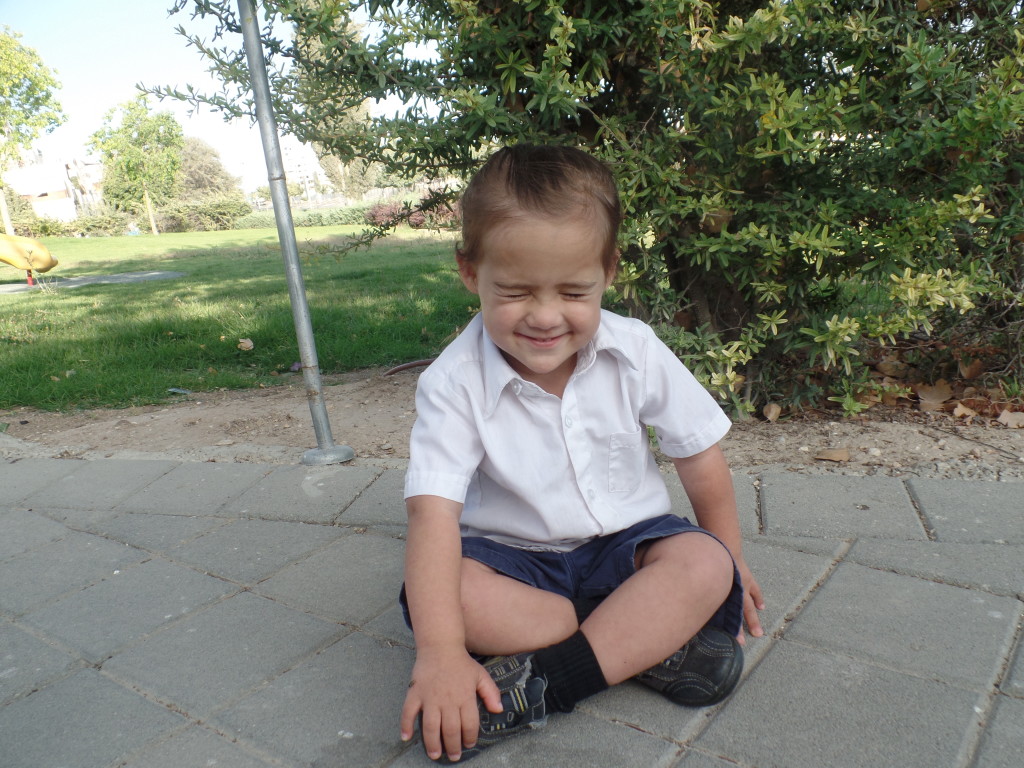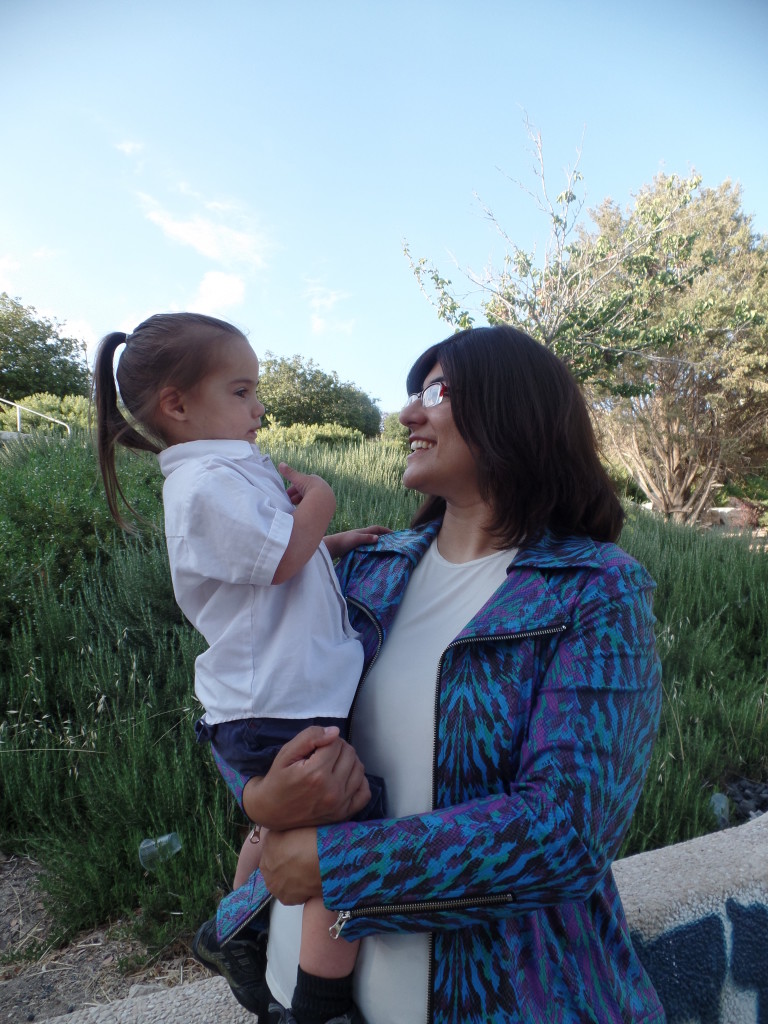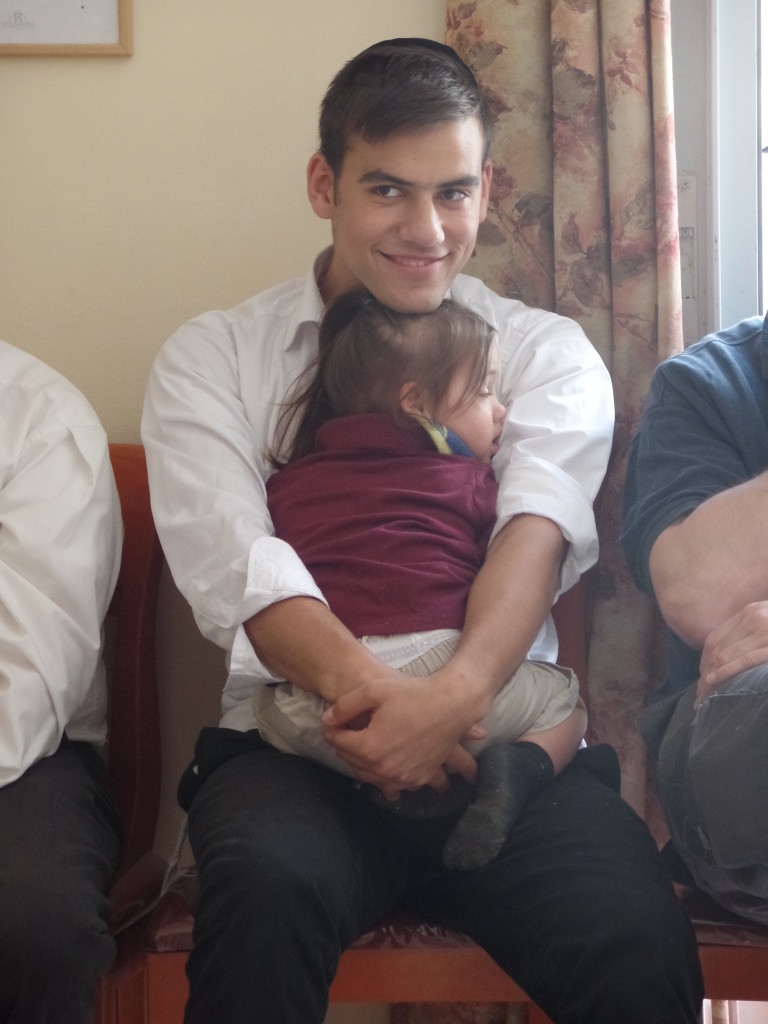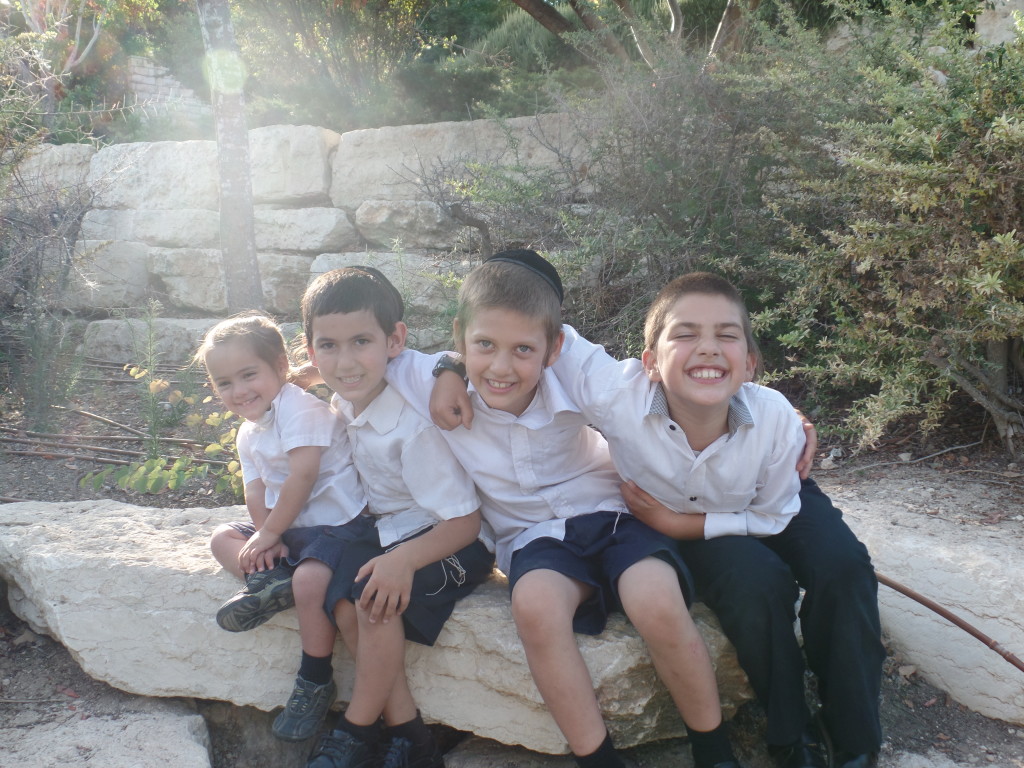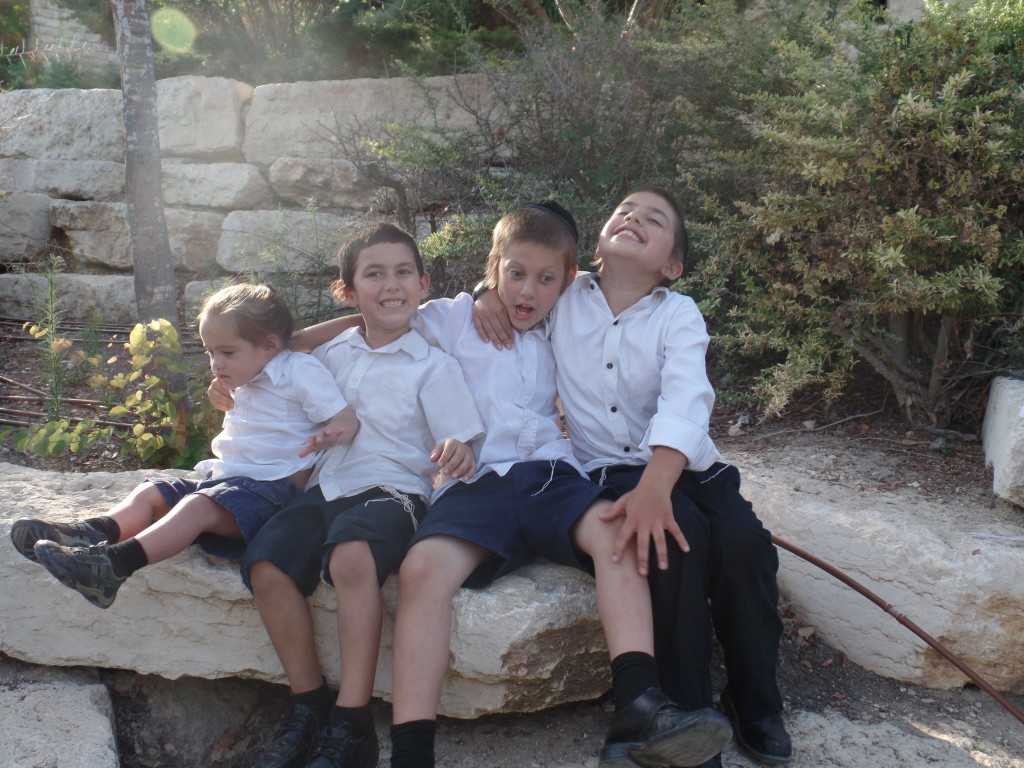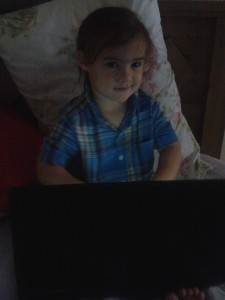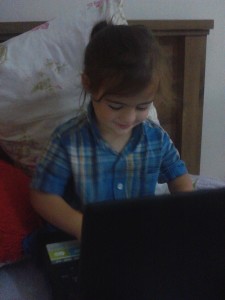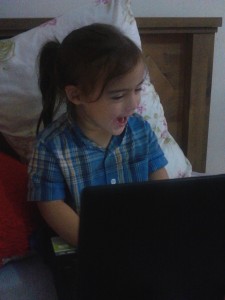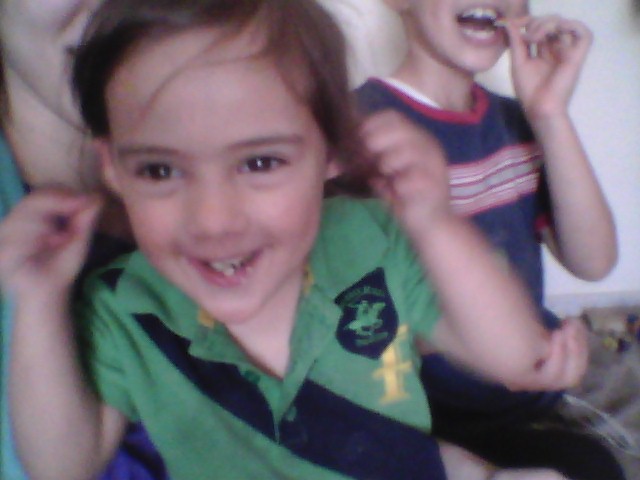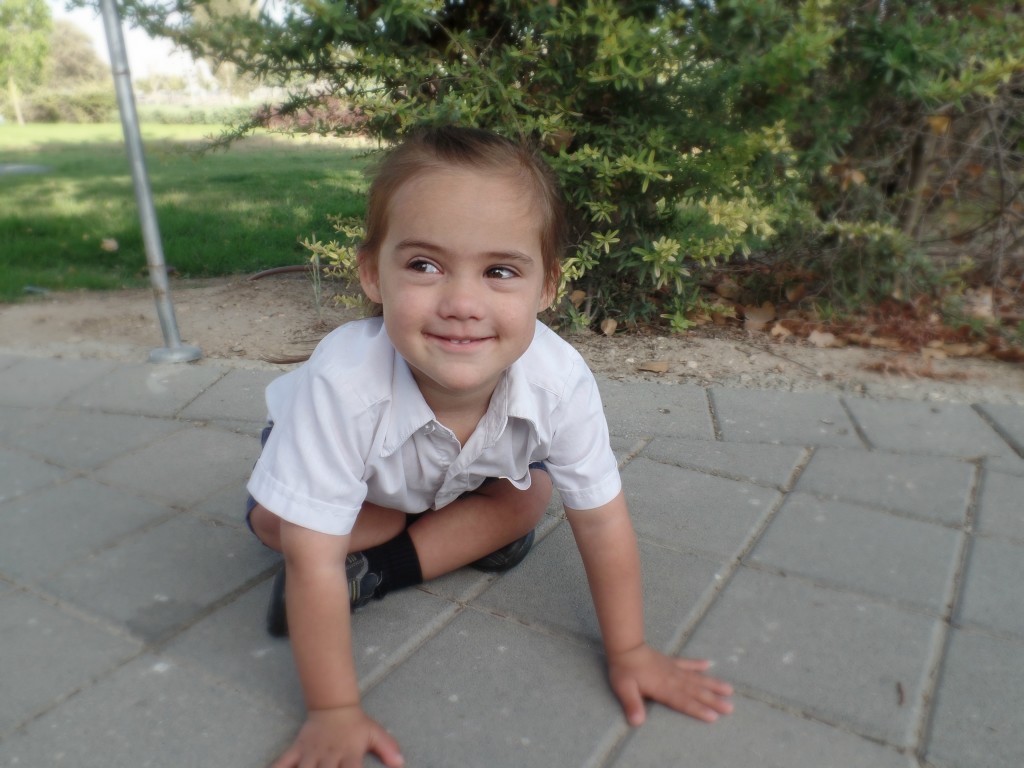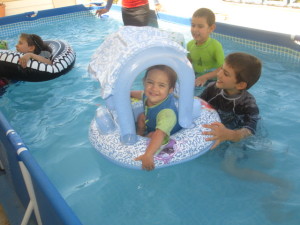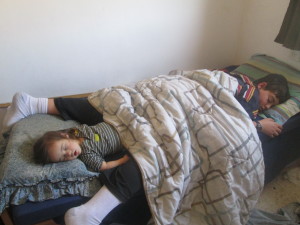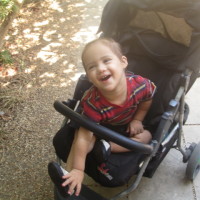Now that Yirmiyahu is two and in my last post I shared the assessment from the professionals at the Feuerstein Institute that he’s doing unusually well, I thought I’d update on what we’re doing to be supportive of him. Hopefully this will be of some help to someone else wondering what steps can be taken to help a child with Trisomy 21.
With a long standing passion for nutrition and alternative health, it’s my conviction that what you eat really, really matters. It affects many more things in the body than we can imagine, and scientists are constantly discovering more and more connections. I also believe that children with T21 need more specific support than the neurotypical child, and will continue to need more support throughout their lives.
Diet – what we do is very basic. Yirmiyahu eats a whole food diet that includes proteins, fruits, vegetable and fats (mostly coconut oil and olive oil, some butter) and limited grains. This is the same as everyone else in the family though we’re more careful with the fats he gets.
We use very minimal amounts of processed foods and don’t give him foods with gluten (wheat protein) or casein (milk protein), both of which are very difficult to digest and can affect the body in negative ways. We limit these with our other kids but are more careful with Yirmiyahu.
For the first two years he didn’t get any sugar; now he gets a Shabbos treat along with the other kids if he answers a parsha question (the question we start with for all of our kids when they are little is, “What day is today?” “Shabbos!” Yes, he knows the sign for Shabbos. :)) Again, this is similar to our other kids.
Nutritional supplementation – I have a strong preference for supplements that are as close to how they were created in nature but we live in an imperfect world and that’s not always possible. Our experience has been that the symptoms associated with T21 require more targeted treatment than what food based supplements offer.
Fermented cod liver oil – okay, this stuff is awesome! It has vitamin D, DHA, essential fatty acids (and a host of other stuff I’m not mentioning), it strengthens bones, teeth and the immune system. It’s a superfood that everyone could benefit from.
Probiotics – probiotics are great for everyone, but for someone with a less optimized digestive system, these are critical. We switched from lactose base probiotics to soil based probiotics several months ago. I now use Prescript Assist; a little bit goes a long way. I give him about a 1/4 – 1/2 of a capsule daily. Homemade lactofermented veggies are another wonderful source of probiotics but Yirmiyahu isn’t yet a fan of them.
Saccharomyces boulardii – I love this stuff! Remember Pac Man, the arcade game of the 80s? That’s what this reminds me of. This probiotic yeast gobbles up the bad yeast and isn’t killed by antibiotics. This isn’t something I’ve read of anyone else using in the T21 or natural foods world but it’s very valuable for us.
Blood tests when he was in the intensive care unit as an eight month old showed Yirmiyahu had candida. Since I had researched candida extensively several years before I knew exactly what this was, but asked the doctor for his thoughts on what it was and what the consequences were. He told me not to worry about it, it didn’t matter. Well, it mattered to me since this overgrowth of fungal yeast will manifest itself in many ways as it increasingly breaks down the body.
Yirmiyahu had a good diet but he constantly had loose stools that seemed to burn his skin – his bottom would be bright red and often bleeding after he had a dirty diaper no matter how quickly we changed him. I tried different things to improve this but the best I could do was slather on a thick layer of zinc oxide cream, which didn’t do anything to improve the underlying problem.
When I added saccharomyces boulardii to his bottles, within a very short time his stools normalized and his rash disappeared. Since I changed his probiotic to Prescript Assist at the same time, it took me a while to be sure which of the two was responsible for the improvement. I began leaving out the probiotic and it became clear this was what was making the difference for him. Since I began giving this to him at the beginning of the summer, he’s had only one bad rash. What used to be a regular sight has thankfully become unusual and I hope this continues. I love this stuff.
This is especially helpful for us since Yirmiyahu gets antibiotics twice a day and I can put it into his bottle together with the antibiotics, unlike probiotics which are neutralized by the antibiotics and have to be given at a different time for them to be beneficial. I ‘m unhappy about these antibiotics but have some peace of mind that I can minimize some of the negative side effects by using this.
PQQ – this is a relatively new kid on the block in the scientific community and is Yirmiyahu’s newest addition. Every person with T21 has neurons that are constantly dying – you understand this is a big concern, right? That means you can’t assume that your child as he is now, will have the same mental capacity in twenty years. It’s well-known that Alzheimers is a huge issue for people with Down syndrome as they age. That’s bad, bad, bad but thankfully there are steps we can take at this young age to counteract this.
PQQ is one of them. PQQ not only slows mitochondrial decline, it helps grow new mitochondria. This is a big part of why I supplement – not to see immediate results, but to help Yirmiyahu maintain his cognition now and avoid the inevitable cellular damage later down the road. He’s on a starter dose of .5 mg per kilo daily.
A very nice bonus is that within a couple of weeks of beginning PQQ, Yirmiyahu became noticeably more verbal.
Multivitamin – we used to give him a multivitamin formulated specifically for people with T21, but switched when he was about 14 months to a different multi that was recommended based on his specific bloodwork (actually it’s an autism multi – GI Pro for anyone who may be wondering).
I’m doing a thorough blood work up later this week and will likely make some changes to his current protocol based on the results that come back. I suspect something is going on with his thyroid because the soles of his feet are dry; he had this symptom in the past (it took a long time until I learned it was a symptom of hypothyroidism) and it cleared up with supplementation. I’m not sure what I’ve changed that his feet are dry again; I suspect it may be because I stopped the additional methylfolate, selenium and B12 I was giving but I don’t know if it’s a combination of all three or one particular supplement that is responsible for this. (All of these are in his multi and I thought he was getting enough through this. )
His thyroid testing when he was about a year old showed elevated TSH and by the time he was eighteen months, we got into a much better range thanks to supplementation. We also corrected his hypothyroid symptoms; he had become very weak and lethargic. The doctor said it was normal for T21 and his blood work was normal; I sent his blood work to two people in the US for feedback and made adjustments to his supplements based on their feedback. He wasn’t properly absorbing nutrients because of his extra chromosome and it was thanks to the addition of supplements that this was corrected and very soon he was back to his energetic and active self.
Ideally his thyroid should be tested every six months (this is a typical recommendation for someone with T21) but this time it’s been somewhat delayed since I wanted growth hormone testing done along with monitoring his blood cell count (we keep an eye on signs of leukemia because of his history), and needed to get that referral from the endocrinologist; I had to wait three months to get the appointment with the endocrinologist that I wanted. This week when we do the blood tests, hopefully he’ll only need to get pricked one time. I wish these tests weren’t necessary but since they are, I try to minimize the discomfort to him by combining as much as possible at one time.
For us, supplements have been very important in helping Yirmiyahu stay healthy.
Hanging exercises – when Yirmiyahu was an infant, we began encouraging him to bear weight by putting his fists around our thumbs as we lifted him a tiny bit. Now every time we pick him up (unless we’re in public, since people will tell us we’re doing something dangerous), we let him grasp our thumbs and pull himself up. This little habit has brought big benefits to Yirmiyahu.
It’s strengthened the muscles in his hands, which is critical for fine motor function. it’s also strengthened his abdominal muscles. He climbs up ladders, slides – he’s totally independent in the playground; despite being so small he manages to climb things intended for children taller and older than him. Recently he shocked and amazed the pediatric endocrinologist when he grasped the edge of the wall mounted sink in her office and began swinging from it. I didn’t think anything of it, but she told me to turn around and watch what he was doing, exclaiming, “Look at him!! Look at him! Look what he’s doing!” She couldn’t believe a child with T21 could have so much muscle strength at such a young age. Ideally I would have him using the monkey bars daily to further develop this but I don’t have them available and so for now, our thumbs it remains! 🙂
Early literacy program – we use a computer program called Brillkids for early reading that Yirmiyahu really enjoys. When he sees me sitting at the computer, he signs ‘words!’ and tries to climb up onto my lap! This program includes categories of commonly used words – transportation, foods, colors, toys, actions, people, animals, etc – and it gives him regular familiarity with concepts and this translates to better understanding the world around him in addition to hopefully setting a foundation for reading. I try to do the computer program twice a day with him and more when possible but five times a day is my max (this is at his initiation). We’re up to lesson 70.
Signing – I’ve taught Yirmi a number of signs and this has been very helpful for him to be able to express himself since his cognition is way beyond his verbal expression, as is true of all young children. The words I’ve taught him are those that are useful for him day to day – for example, when I noticed how frightened he became when he heard fighter jets roaring overhead, I taught him ‘airplane’, ‘loud’ and ‘scared’. Now he has a way to tell us what he notices and what he’s feeling – when he hears them from a distance, he will tell us he hears an airplane, or that it’s loud, but only tells us it’s scary when they’re very close. He also can tells us when something else scares him. I need to spend some time thinking about what vocabulary would be helpful for him now, so I can look up those signs and teach them to him. Signing is a wonderful tool.
Communication – I talk to Yirmiyahu a lot and explain what we’re doing as we go along, and have been doing this since he was young. Most of this is intuitive. I have one of the books by Dr. James McDonald called Play to Talk, and this helped me tweak what I was doing to be more effective. He writes a lot about how a parent or sibling is the best play partner for a child and it’s through play that a child learns the most. He gives clear guidelines for how to make interactions with your child a meaningful opportunity for communication and connection.
Craniosacral work – I take Yirmiyahu about once every 5 – 6 weeks to a wonderful osteopath who does craniosacral work on him. She works on different specifics each time depending on what area of the body she sees needs the most balancing. She almost always works on his respiratory system since this is a part of his body that has always been weaker. This week she did a lot of improve circulation and to help flush out his system (important since people with T21 are less able to get rid of toxins on their own). When he was an infant, one eye would periodically get goopy, but after she began working with him to release the underlying block in his facial structure, this disappeared.
I’ve asked her to work on his palate since it remains high and narrow even though it’s improved quite a bit since he was born. This is important since the pituitary gland is above the palate and I want that to function as well as possible. It was easier for her to work on this when he was younger since now when he bites down, he has teeth! She does most of the facial work externally and very quickly; most of her time is spent on the rest of his body.
Siblings – my kids are crazy about Yirmiyahu and I can’t overstate how important they are in his life. He has constant playmates and plenty of opportunities to see and model typical behavior, which is no doubt why his social skills are so good. He doesn’t have to be taught to take a turn or throw a ball to someone – it’s part of his daily life!
**Disability Is Natural** – The mindset that underlines everything I do and how I do it is based on accepting Yirmiyahu exactly as he is right now and believing in his abilities. I was gifted with the book Disability Is Natural when Yirmiyahu was very young. Quite some time ago I commented to my husband that over the years, my paradigm of what I assumed to be true and what I now believe had shifted in several key areas that changed my life – pregnancy/birth, education and health/nutrition. With all of these I grew up accepting what everyone did as the norm until something prompted me to explore an alternative viewpoint, and each paradigm shift dramatically changed my life. I commented to him rhetorically, “I wonder what the next life-changing paradigm shift will be?”
This book was it. This prompted my next huge shift in thinking about a topic I had never given much thought to. It is so powerful and I think it should be required reading for everyone on the planet. 🙂 Seriously. This will give you so much food for thought and affect your parenting of all of your children and others you interact with in a positive way. Fortunately, the author has a website with a free newsletter so you don’t have to spend a penny to read more – http://disabilityisnatural.com/.
When I read this book, I kept thinking, this woman thinks like me! (I did keep wondering how with her personality she dealt with the constraints of the school system and the necessary advocacy – and then in the end she wrote about discovering homeschooling and stated that she wished she had done that from the beginning!) This paradigm has helped me to find the inner balance of being proactive in addressing Yirmiyahu’s needs and fully accepting who he is.
Avivah

![People-First-Language-2[1]](http://avivahwerner.com/wp-content/uploads/2015/11/People-First-Language-21.jpg)
